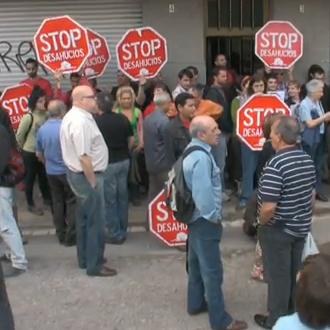Eviction Stoppers of Spain
Desahucios300
In Spain, citizens continue to protest in city squares, demanding an end to high unemployment, corruption and financial policies that they say favor banks.
Protesters say that since the financial crisis began in 2008, more than 300,000 families have been evicted from their homes for failing to pay their mortgages. Now the protest movement is helping future evictees fight back: Just post your upcoming eviction notice on their website and hundreds of protestors will show up and literally block the police.
Here’s how the group works: If you’ve gotten an eviction notice, send a distress call to Eviction Stoppers’ webpage and you could find a big crowd outside your front door.
Adria Alemany, an economist and leader of the Association of Those Affected by Mortgage, says Eviction Stoppers won’t help everybody. First, that you have no money to pay your mortgage, and second, the property in question has to be your main residence.
It’s not fair that hundreds of thousands of Spanish families are being evicted from their homes while government give millions of dollars to keep banks solvent, Alemany says.
Some 300 Eviction Stoppers gathered in Montcada, Spain, earlier this month to keep local officials from putting a woman named Isa and her daughter out on the street.
One activist addressed his colleagues before the confrontation, saying that he wanted to “maintain a relaxed attitude … I don’t expect the police will come, but if they do we’re not going to respond to provocations. That said we’re going to block access to the house so that Isa and her daughter don’t lose their home, the eviction is postponed and the bank accepts a compromise.”
In this case, Eviction Stoppers would like to see the bank get full ownership of Isa’s apartment, and let her stay, paying a rent below what her mortgage payment was. This way the bank gets something and Isa and her daughter aren’t out on the street.
If Ida is evicted, her financial problems will continue. As a result of Spain’s housing market crash, Isa’s apartment is now worth less than what she borrowed from the bank to buy it. So handing over the keys doesn’t cancel the debt.
Under Spanish law, the bank has the right to go after Isa until she’s repaid every penny she borrowed. The bank can also collect her future earnings, and those of her children.
In the 1990’s when the housing boom started, money was flowing everywhere. Banks ran ads on television promising to convert your hellish life to heaven, if you would buy a home. Ads encouraged citizens to borrow a more, too, for furniture, or a car.
How times have changed.
Now people in Montcada struggle to keep their homes. When police and a town official showed up to evict Isa, Eviction-Stoppers literally blocked their way. The eviction was postponed until September.
Still, it’s clear the banks aren’t rolling over. Few have agreed to the kind of compromise protesters are calling for.
Before leaving Isa’s street, one town official warned Isa that if she’s not out of the apartment by eviction time, Child Services would take her daughter away.
People like Isa thought they would find relief this month in Spain’s parliament. But last week, lawmakers rejected a measure that would have allowed mortgage holders to cancel their debts by handing over the keys to their home. Banks lobbied against it, arguing that such a measure would ruin them.
